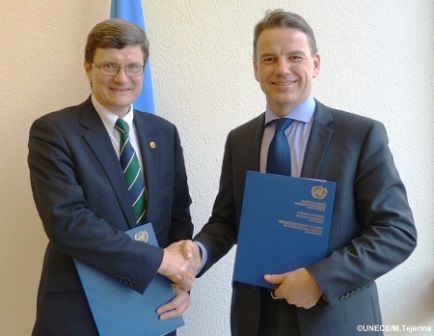
With 75 percent of the European population living in cities, more space is needed for expanding urban areas, yet at the same time there is a growing need for agricultural land and for the protection of key ecosystems.
Rising competition for land ownership, reduced availability, and declining land quality are among the consequences. Finding the right balance in land use – in terms of space, cost and uses – is the aim of a new agreement signed here today by the UN Economic Commission for Europe (UNECE) and the Food and Agriculture Organization of the United Nations (FAO).
Land use and land management can only be improved by strengthening land governance, by building land management capacity in the public sector, and by balancing production demands on land, according to UNECE and FAO.
In signing the Memorandum, UNECE Executive Secretary Christian Friis Bach noted that the agreement formalizes the already strong cooperation between the two organisations on developing national capacities in Member States on land administration and management.
The agreement also follows a longstanding partnership and joint ECE-FAO office in Geneva focused on forest matters, which have proven successful in promoting sustainable forest management in the region since 1947. A recent ECE-FAO report on trends and challenges for sustainable forest management, for example, shows that the main factor in loss of forests is urban growth.
The land-related agreement will encourage a greater sharing of knowledge and information and create a solid basis for addressing land management issues in the region. Governments, international organizations, civil society, academia, and the private sector are all expected to play a role.
The importance of FAO-ECE cooperation for effective implementation of the Voluntary Guidelines on the Responsible Tenure of Land, Fisheries and Forests in the Context of National Food Security was underlined by Vladimir Rakhmanin, FAO Assistant Director-General and Regional Representative for Europe and Central Asia. The Voluntary Guidelines, endorsed by the Committee on World Food Security in 2012, are the first comprehensive intergovernmental global instrument on tenure and its administration.
FAO and UNECE, as well as the World Bank and the Joint Research Center of the European Commission, work together to advise governments on how to integrate the Voluntary Guidelines’ principles into the ongoing land reforms – through land administration projects and specific policy advice.
For more information, please visit: http://www.unece.org/housing
or contact:
Gulnara Roll, Head, Housing and Land Management Unit
Email: [email protected]
Telephone: +41 (0)22 917 22 57
Additional links:
UNECE Working Party on Land Administration
http://www.unece.org/housing-and-land-management/about-us/working-party-on-land-administration
Sustainable land management, FAO
http://www.fao.org/nr/land/sustainable-land-management/en/
Forests in the ECE Region: Trends and Global Challenges on Achieving the Global Objectives on Forests
http://www.unece.org/DAM/timber/publications/forests-in-the-ece-region.pdf

